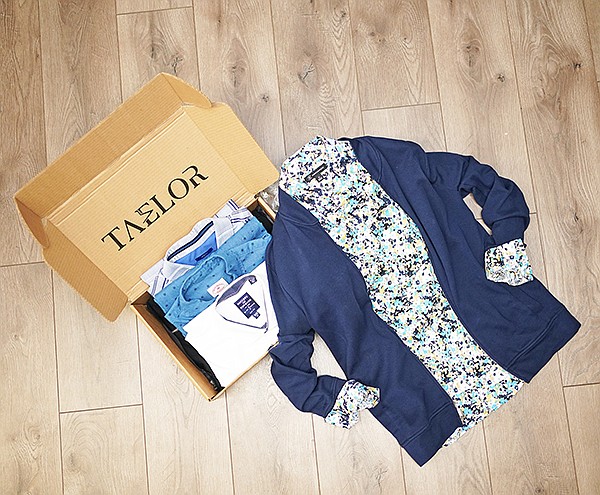Initially focused on shirts that appeal to both men and women in its pilot program, Taelor has plans to expand into pants in the near future. | Photo courtesy of Taelor
RENTAL REDESIGN
Using AI, Taelor Affords a Perfectly Fit Fashion-Rental Experience to Its Customers
Looking around the fashion-rental space, Anya Cheng noticed a heavy focus on women’s apparel. With a career that includes working in social-media commerce for platforms on Facebook and Instagram, in addition to a position with Target, during which Cheng led the retailer’s digital transformation through development of its mobile-tablet application, she used these experiences to develop Taelor. Describing herself as “not very fashionable,” Cheng had used Rent the Runway and enjoyed it but wasn’t fond of having to sort through pages of clothing options.
“I always want to look good and showcase the best of myself for the job, for a date or social gathering, but I don’t have a sense of fashion and I didn’t want to spend a lot of time chasing after clothes,” Cheng explained.
Also a career coach, Cheng teaches people to navigate their course and develop confidence. An aspect of increasing confidence, Cheng says, is helping clients learn how to present themselves to potential associates, business partners and employers. Blending her own desire to always appear presentable to employers with her career coaching, Cheng began taking steps to examine how to help those who experience the same challenges she faced.
“I interviewed 500 people and found out that many have the same problem,” Cheng said. “Surprisingly, a lot of them are busy men—young men—average 32 years old. Most were single, and they have a goal in mind—they want to go on a date, get a job interview or get a job promotion.”
Taelor’s pilot launched in May on taelor.style as a rental service that focuses on men’s shirting by sharing boxes of four shirts on a semimonthly basis. For the service, subscribers are charged $69.99 per month, and while it remains in the pilot stage the company offers only a medium but will be expanding to include a full range of S–XL by the end of the year. Customers can buy shirts that they enjoy wearing at a discounted price. There is also a fashion-styling service that members can access to guide them through the appropriate way to wear their clothes.
“We know people’s true preference, which is really powerful data,” Cheng said. “We know that AI is useful, but the most important thing that you have is unique data. Rental really enabled us to do this. We also found that our customer really liked it. Forty percent of our customers today are engineers, and they are very into having stylists but also what AI will tell us.”
The service is resonating with women as well who feel more comfortable wearing menswear. As fashion-rental services serve customers who seek variety in their wardrobes, to reduce their consumption and examine apparel without commitment, the future seems bright for Taelor, particularly due to the demand for employees to appear presentable as they continue to work from home and attend meetings over video conferencing.
“At the moment, we offer only shirts because we are running a pilot, but our customers told us they want a complete outfit,” Cheng said. “We plan to launch pants in the near future. We have styling tips that mention the pants that would be best to wear with a certain shirt, but because people are still working from home upper body is what they really care about.”
Brands are starting to take notice, as Taelor continues to partner with the labels from which it sources its goods. Google recently agreed to add the company to its options for employee perks. Taelor currently offers 50 brands, and while all are not sourced through partnerships the company’s current partners include Barque New York, Modern Liberation, TAGS, TRANZEND and Reese De Luca, a genderless Montreal-based brand that offers apparel in soft, high-quality fabrics. For the brand’s namesake creative director and designer, contributing to a sustainable fashion space is a large draw to working with Taelor.
“As a small brand, I always produce everything in really small quantities, so I don’t make more than 30 or 40 pieces per style,” De Luca explained. “What I love about Taelor is that my garments, which would normally have one life cycle, have multiple life cycles. My 30 pieces will go way further than that. It [a garment] touches more people but also it’s in the system longer and there is less chance of it ending up in a landfill six months down the road.”
At partner TRANZEND, which creates suiting from recycled plastic bottles and coffee grounds, the company’s co-founder and creative director William Chen also enjoys Taelor’s commitment to reducing waste.
“Sustainability is a big part of TRANZEND’s product. Therefore, being a part of sustainable practices such as rental and resale makes sense to our business,” Chen explained. “When you own fewer pieces, every piece does more, and this is what Taelor is providing for their consumers, giving them a chance to really feel and try out what they really need and like, which decreases unnecessary purchases.”
With a team that includes artificial-intelligence experts from companies including Google, Facebook and eBay, Taelor is positioned to shape the future of fashion retail. From creating algorithms that rely on the data provided by customers through their preferences and styling sessions, Taelor is developing a platform that makes fashion rental a seamless process.
“Over time, we know AI will not just be about scaling the styling service, but AI knows you probably better than yourself,” Cheng said. “In rental, people specifically tell us that they don’t want us to recommend stuff they already like. They want to broaden their horizons so they can keep trying new things. This all feeds into the algorithm for trends and provides recommendations for customers and stylists in the future.”






















